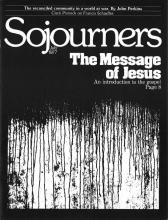Written as an introduction to a new Spanish edition of the New Testament, Sojourners obtained this original English translation (done by Sister Kathleen England), and is introducing this remarkable study to American readers. Juan Mateos, born in Spain in 1917, was a Jesuit scholar of biblical studies and church liturgy, and was teaching at the Oriental Pontifical Institute in Rome, Italy, when this article appeared. -- The Editors
The Jewish World at the Time of Jesus
At the birth of Jesus, Herod I the Great, an ally of the Roman emperor, reigned in
Judea, the southern province containing
Because of his cruelty, Archelaus was deposed by the Romans and exiled; in his place
The Roman government left the Jews a certain freedom of movement. Herod in the North enjoyed relative independence and Roman officials did not usually interfere in internal Jewish concerns in the South, although there were fairly frequent exceptions.
Read the Full Article

